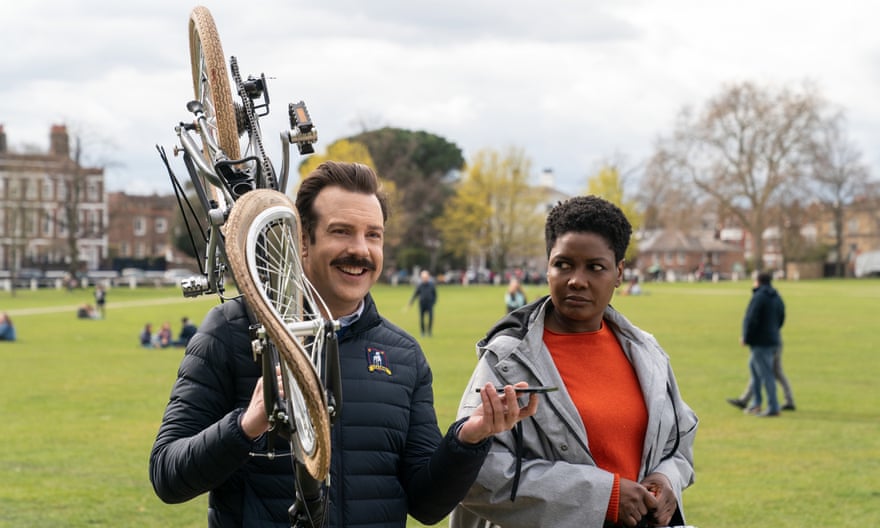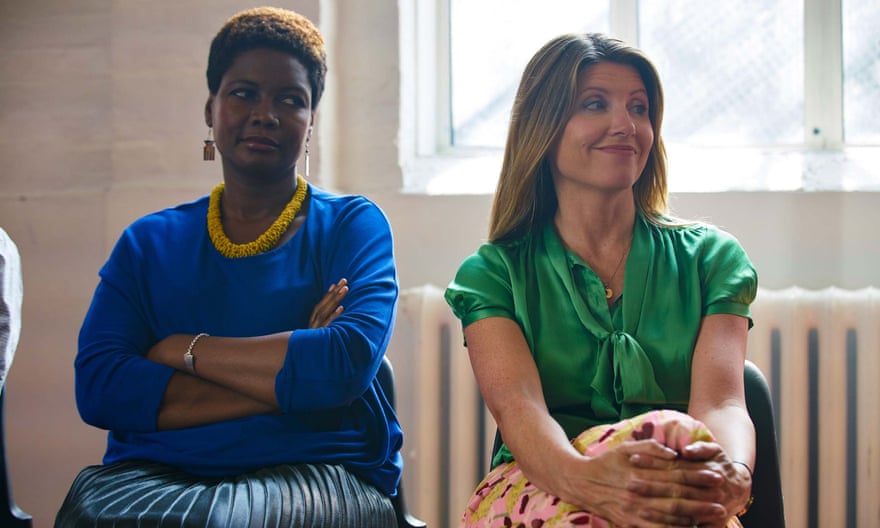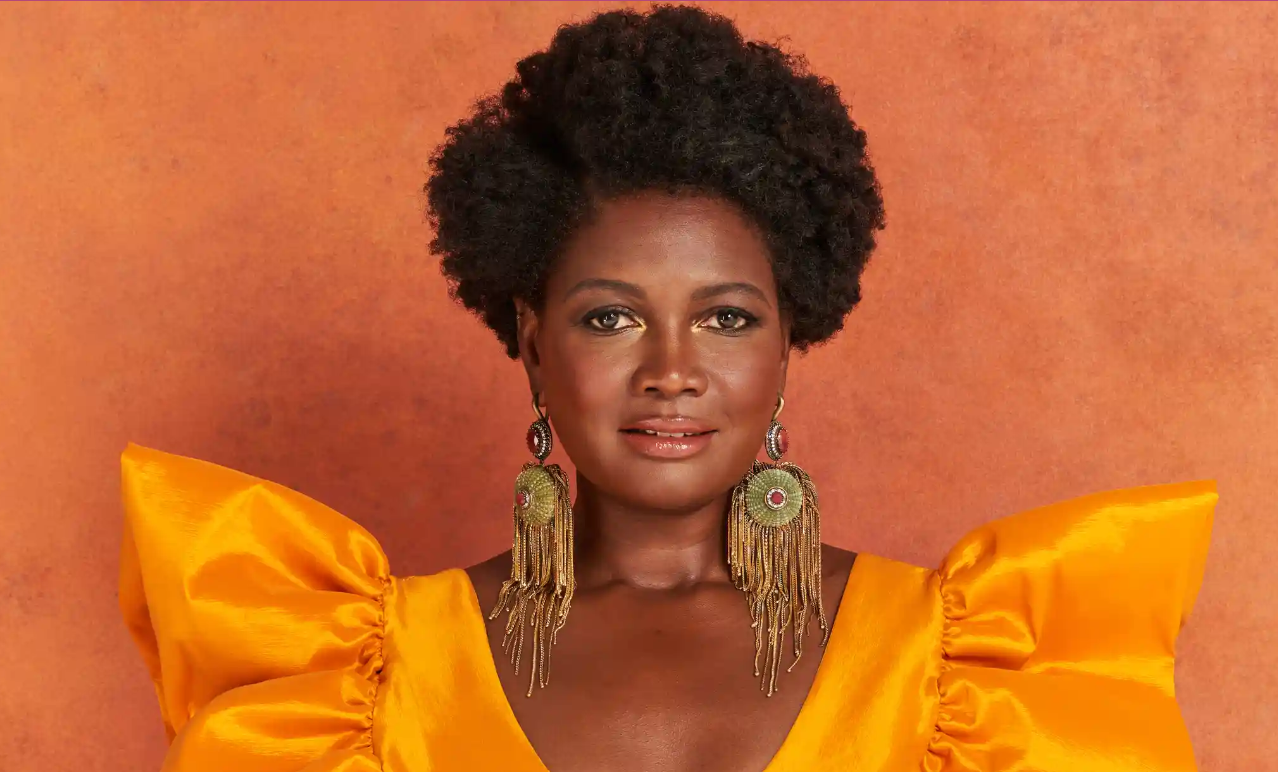It might be the medical breakthrough the world has been waiting for. Based on a sample size of one, it appears that an Emmy nod can cure Covid. Sarah Niles was laid up in bed at home in London when she heard that, 5,000 miles away in Los Angeles, she’d been nominated for best supporting actress in a comedy series. “I was feeling really sick,” she says, “but I soon got better. A few hours later I started testing negative.”
Her role as the sports psychologist Dr Sharon Fieldstone in the hit football comedy Ted Lasso has brought overdue acclaim for an actor who’s been flitting between stage and screen for two decades. Niles is a regular performer at the National Theatre, the Royal Court, the Old Vic and the RSC. TV viewers might recognise her from I May Destroy You, as Officer Funmi, who interviews Michaela Coel’s character after she’s raped. Or from Catastrophe, as Sharon Horgan’s sarky schoolteacher colleague Melissa. Film fans might know her from Mike Leigh’s Happy-Go-Lucky, or Sarah Gavron’s Rocks.
Now, in her mid-40s, fame and acclaim are finally arriving. “I’m probably in a better place to handle it now,” she says. “I’m certainly a much better actor.” She pauses and laughs. “But I still would have liked to be a bit more successful earlier on. I’ve been acting professionally for 20 years – it’s been a long time coming. I’ve had so many lovely messages: ‘You deserve all your flowers, Sarah.’ ‘You’re here and you’ve always been here.’”
Alongside the mighty Succession, Ted Lasso dominates the Emmy shortlists. They’re like the Manchester City and Liverpool of prestige TV’s Premier League. Ted Lasso clocked up a whopping 20 nods in total, making it the most nominated comedy for the second year running. Niles is joined in her category by castmates Hannah Waddingham (who plays club owner Rebecca Welton) and Juno Temple (WAG-turned-PR whiz Keeley Jones).

Dr Sharon arrived in season two of the much-loved soccer-com, helping to bring new depth to the show’s characters, and providing a gear change from the goofy comedy. For Niles, the key to her understated performance is stillness – not always easy when you’re playing the straight person to the show’s star and co-creator, the American actor Jason Sudeikis.
“It’s hard,” she admits. “I giggle so much, it’s ridiculous. People often say I’m the one who laughs most on set, but that’s between takes, then I turn my poker face on. When he cast me, Jason described my character as all-seeing and all-knowing. So I just try to ground myself, trust myself, be still and watch him. It’s fascinating to just sit and observe someone like that.”
Niles’s role in such a blockbuster hit is striking a chord with audiences on both sides of the Atlantic. “So many people have come up and said how important it is, seeing her up there. Women love her because she’s unashamedly able to say that she’s good at her job. Not with arrogance, just with confidence. So often, both as women and as Brits, we self-deprecate and apologise. We think that if you downplay your qualities, people will be more attracted to you. That’s not the case and no way to live.”
She goes on: “A lot of Black women, especially in America, love Dr Sharon because she’s standing in her power and her strength. It’s about seeing yourself represented. Often when you see Black female characters on screen, they’re going through some kind of turmoil. Dr Sharon just exists in her power. I’ve learned a lot from playing her. I’ve always apologised for my talent, tried to be not too on the front foot. But to embrace your gifts is exciting.”

Niles was born in Thornton Heath, south London, the youngest of three children, to Barbadian parents who came over in the late 1950s. Her father was an electrician, her mother a care nurse. Young Sarah would accompany her mum on weekly shopping trips to Brixton market. One of her earliest memories is seeing the aftermath of the 1981 riots. “I used to listen to the grownups talking and remember saying, ‘I like Michael Foot, but Margaret Thatcher is stupid!’ I had no idea what I was talking about, but it went down well.”
Shy and awkward, she wasn’t your typical show-off. But she adored listening to the stories of her parents and their friends – tales from back home in the Caribbean, gossip from the “blues parties” they threw at one another’s houses. It was the transporting element of storytelling – “trying to find home”, Niles suspects, as a daughter of immigrants – that led her towards acting. School plays gave her a chance to “try not being myself and explore”. She later trained at Manchester’s Capitol Theatre, whose alumni include Steve Coogan and David Threlfall.
Her childhood heroes were the singer Lena Horne, the actors Diahann Caroll and Mona Hammond, and incongruously, Queen frontman Freddie Mercury. She daydreamed about being part of the A-Team, and watched TV comedy with her dad while he roared with laughter. “Some of it was so inappropriate: Les Dawson, Kenny Everett. He loved Alf Garnett, too.”
In recent years, their relationship has entered a new phase. “My dad’s got Alzheimer’s now,” she says. “It’s such a strange and cruel disease. It makes me quite melancholy, but my parents always taught me to find beauty in the cracks of a thing. So what it has allowed me to do is have some beautiful moments being in the present with him and enjoying those times together while we can. You’ve got to bask in the sun of life.”
Niles now has a 10-year-old daughter of her own – and a cat – with her husband, an artist who runs community workshops for people with autism and learning differences. The key to their happy marriage? “Acceptance and finding time to a have fun together. We’ve got this little plaque on the mantlepiece that says ‘Adventure is worthwhile.’”
Niles counts herself fortunate to have worked with two of our finest female screenwriters in Sharon Horgan and Michaela Coel. She adored her time on Catastrophe (“One of those rare scripts where you keep turning the pages and can’t stop cracking up”) and she can’t speak highly enough of I May Destroy You. “It was one of my favourite times ever on set,” she says. “I come from a theatre background and this had similar energy. It felt like we were a company – sensitive, supportive, all taking care of each other. It was wonderful, but sad as well. I’m humbled that Michaela Coel was brave enough to put that piece out there. It was probably a necessity for her. A proper piece of art. I’ve never had an experience like it.”
The running thread through her memorable TV roles, Niles decides, is that stillness. “I’ve started to realise that all those characters have a kind of resting place. Dr Sharon’s like that. Funmi the police officer and Melissa the teacher is like that. I’m quite bouncy and hyper in real life and I probably don’t get enough sleep. But on screen, stillness is my power.”
There have been glimpses of vulnerability beneath Dr Sharon’s coolly poised exterior. It’s implied that she is lonely and viewers saw her flat littered with empty wine bottles. Niles is tight-lipped, but hints that this might be explored further in the upcoming third series. “She’s got hidden depths. There’s so much juice there. Dr Sharon needs her own spin-off, basically.”

Has Niles had therapy herself? “Yes. I was actually having therapy while shooting Ted Lasso because so much was happening with Covid, with Black Lives Matter, with trying to self-care in lockdown. My daughter was asking me questions that I didn’t have the answers for. I decided it was my duty to be a better person and help out, so I got back into therapy.”
We’ll next see her on screen playing the villainous matriarch in the glossy new drama Riches – an ITV/Amazon co-production about a self-made black British family with a multimillion cosmetics empire. It’s been described variously as “a love letter to Black London” and “the Black Succession”.
“I can see why, because it’s about a family at war, vying for power,” Niles says. “But it could also be a catalyst for all kinds of conversations. For a long time, we only really saw Black people on TV in crime dramas. There would always be guns or drugs involved. But I remember watching the first episodes of EastEnders back in the 80s. There was a Turkish family, a Black family, Asian characters. I was like, that is it! That is London! Somewhere down the line, we lost that multicultural Britishness that makes this country so unique. We rarely see diverse characters sharing space. We panic and think there has to be some big explanation for why they’re together, rather than just existing.”
Representation is improving, albeit slowly. “There’s still so much work to be done,“ she says. “We came across some hurdles with Riches. Part of the problem is that these Black Britons haven’t been seen on TV before. In the real world, our appetite and our need for those stories is miles ahead of what’s being shown on screen. I’ve yet to see older Black women sharing space. The other night, I was watching [director Steve McQueen’s film] Widows, with Viola Davis and Cynthia Erivo, thinking, ‘I can’t wait until we get to that place.’ We’ve got so many more stories to tell in this country.”

Niles still experiences all manner of micro-aggressions – from casting directors making assumptions about her accent and social class, to airline cabin crew assuming she’s travelling economy, not business class. “There’s so much gatekeeping going on,” she sighs. “There might just be one Black person per show, or just a small group of Black actors who get the opportunities. I’ve been up for roles against people like Michaela [Coel] and Wumni [Mosaku], who are a decade younger than me. It got to the point where I’ve thought: ‘What’s going on here?’ I spent a lot of time worrying that I wasn’t the right type of Black actor to get certain roles. But there’s got to be room for all of us. I love the fact that lots of actors are taking control by trying to write and create their own work.”
The UK screen industry is lagging behind, says Niles. “Sometimes people over here get scared. On Ted Lasso, for example, it’s a fascinating dynamic. Ted’s white, male, all-American, very positive, while this Black woman is a little bit distant. There’s conflict and cultural difference there. It took an Apple show to do that, I’m not sure a British show would be brave enough. And theatre is absolutely ahead of screen. I’ve done a lot of plays at the Royal Court where those characters wouldn’t necessarily have been a Black woman on screen. But it will change because the younger generation aren’t going to stand for that.”
As an 80s kid, Niles says Riches reminds her of super-soaps like Dallas and Dynasty. Does that make her Joan Collins? “I wish!” she laughs. “That woman is beyond classy. You have to be on this earth quite some time to learn that. I made a beeline for her at the launch night of The Elephant Man with Bradley Cooper, but suddenly got starstruck. My chest got tight and all this crap came out: ‘I’m a big fan, love your work.’ And she said, ‘I love yours too, darling!’ And I was like, ‘No you don’t, but that’s a very good answer.’ She’s gutsy and unapologetic. I love how hard she and Diahann Carroll fought for equality on that show, both financially and creatively.”
It’s not just ethnic diversity where showbiz needs to raise its game, it’s ageism, too. “Growing up, I watched a lot of programmes with older women, but I worry we’ve gone backwards a bit,” Niles says. “I hope there’ll be a renaissance. So many of the women I look up to as actors are just so gorgeous and sexy. They just reside in this power that you cannot understand in your 20s. They’ve got so much: vulnerability, experience, sense of humour. And they’re so naughty, it’s delicious. I can’t wait to hit my 50s and 60s. If we could write women like they are in real life at those ages, there’s some exciting characters to play.”
She’s already ticked off one of her dream film directors in Mike Leigh. “I found his improvisational way of working so liberating,” she says. “He helped me trust my talent.” Who else is on her bucket list? “Paul Thomas Anderson, the Coen Brothers, Jordan Peele, Barry Jenkins… So many.”
She recently shot a role as the mayor in the forthcoming movie The Toxic Avenger, starring Peter Dinklage as a nerd turned monster. “I only did a few scenes, but loved it,” she grins. “It’s a weird, wacky, culty comedy-horror. I auditioned and found out I got the job when [writer-director] Macon Blair sent me a DM on Twitter. That made me laugh even more because it’s not how things are normally done. My agent said ‘Let’s wait for confirmation in an email’, but I was like, ‘Nah, I’ve got the gig.’”
When the Emmys ceremony takes place in a few weeks’ time, Niles will be there in all her finery (probably something sequined, she predicts), sitting shoulder pad to shoulder pad with teammates Temple and Waddingham. “There’s no sense of competitiveness,” she insists. “We’re all so happy for each other. Just being on the shortlist is the stuff of dreams because that’ll be forever: Emmy nominee.”
Sarah Niles from Thornton Heath: Emmy nominee forever.
Ted Lasso season 2 is currently streaming on AppleTV+














